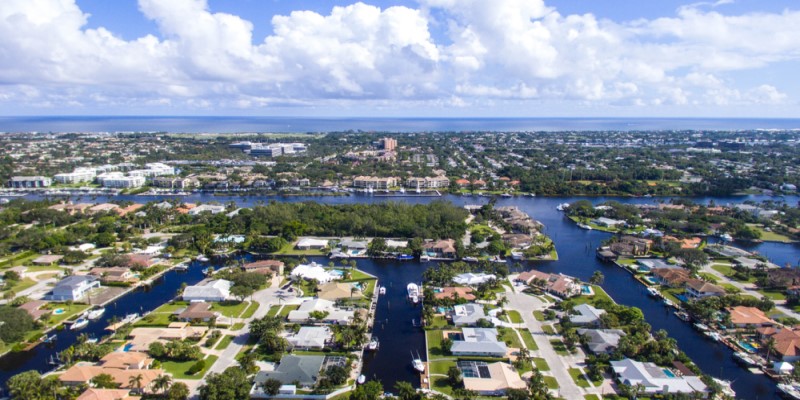
By Anayat Durrani
Florida’s legislature has made efforts to thwart foreign ownership of real property in the sunshine state. Governor Ron DeSantis signed into law SB 264 on May 8, 2023, which prohibits foreign principals from “countries of concern” from owning or acquiring agricultural land in the state or any interest in real property within 10 miles of any military installation or critical infrastructure in Florida, such as a seaport or airport. The law goes into effect on July 1, unless the court steps in.
The foreign countries of concern include Cuba, Russia, Iran, North Korea, Venezuela and Syria. However, China is mentioned the most, as the language specifically explains how the legislation applies to the Chinese government and those connected with it and comes with stricter restrictions and penalties.
In the EB-5 investor community, the law could have an impact on investors hailing from those countries.
“This new law has a plethora of implications, many of which will only be known in time,” says Tammy Fox-Isicoff, partner, Rifkin & Fox-Isicoff PA. “As an RC, would it want to be responsible for a project in a state with so many scary limitations? As a project, would it want to be involved in a real estate development with so many limitations as to whom property could be sold to? As a Chinese, Venezuelan or Russian would I want to acquire an interest in any business located in a state that clearly doesn’t want my business?”
Fox-Isicoff says there are so many RC structures that it would require careful lawyering with many different legal specialists to understand what can be done or could violate discrimination provisions.
“It’s a total mess and clearly will result in diminished opportunities for real estate investment in Florida,” says Fox-Isicoff.
How the EB-5 industry should interpret Florida’s new bill
Miami immigration lawyer, Michael A. Harris, HarrisLaw, P.A. says though the bill does not specifically mention the EB-5 program, it could have a serious impact on EB-5 real estate development in the U.S. He says for the direct EB-5 program, if it involves the purchase of real estate, the bill could limit options for foreign investors looking to participate in the EB-5 program.
“They might be restricted from purchasing agricultural land and certain types of real estate in Florida, and they might be required to divest themselves of certain real properties within a specified timeframe,” says Harris.
He says projects associated with regional centers, which are typically large-scale development projects that can include real estate, may be impacted due to foreign investors being deterred by the potential restrictions and penalties associated with acquiring real property in Florida, “which could ultimately lead to a decrease in foreign investment through regional centers based in Florida.”
Under the bill, Harris says Chinese and Venezuelan citizens deemed to be foreign principals of an EB-5 project may be prohibited from directly or indirectly owning, or acquiring a controlling interest in agricultural land in Florida.
“This does not apply if the ownership is less than 5% of any class of registered equities in a publicly traded company owning the land, or a noncontrolling interest in an entity controlled by a company that is registered with the United States Securities and Exchange Commission as an investment adviser,” says Harris.
However, he says the impact could be severe for citizens of China and Venezuela that are investing in the EB-5 program in Florida.
Maria Isabel “Marisa” Casablanca, partner chair, Immigration Planning and Compliance Practice, Akerman LLP says from her experience the most significant impact will be investments from citizens of Venezuela.
“My first Venezuelan EB-5 investors were 25 years ago during the presidency of Hugo Chavez. Since then there has been a steady stream of these investors,” says Casablanca. “The Venezuelan diaspora in Florida has grown extensively and this bill will affect both direct and regional center investments.”
Harris says another group that may be impacted are dual nationals and says the bill does not provide specific exceptions or provisions for them.
“The impact on dual nationals who may be Venezuelan and Spanish citizens, or Chinese and Canadian dual citizens, would likely depend on how the term “foreign principal” is interpreted in practice,” says Harris. “My concern is that without further definition, many individuals will be deterred as a result despite their dual nationality.”
Lawmakers did add an exception later that allows foreign nationals with non-tourist visas to buy a residential property of up to 2 acres if it is not located on or within five miles of a military installation.

Concerns raised from Florida’s new real estate law
Gov. DeSantis has argued that the law is needed in order to protect Florida from the Chinese Communist Party and its activities. However, the bill has raised concerns about racial profiling and discrimination. Congressional Asia Pacific American Caucus Chair Representative Judy Chu (CA-28) said in a statement that she was outraged by the law and said Florida government’s “scapegoating and stripping of the land ownership rights of Asian American communities are stains on our nation’s history.” Others have criticized the law as violating the Fair Housing Act, which prohibits discriminating against home buyers on the basis of race or national origin.
A lawsuit was filed on May 22, 2023, to challenge the discriminatory property law. The lawsuit argues that the bill will codify and expand housing discrimination against Asians and violate the Constitution and the Fair Housing Act and cast suspicion on those seeking to buy property whose name appears Asian, Russian, Iranian, Cuban, Venezuelan, or Syrian, per an ACLU statement. They also said it “unfairly equates Chinese people with the actions of their government” when there is no evidence of any national security issues from Chinese owning real estate property in the state.
“All Asian Americans will feel the stigma and the chilling effect created by this Florida law, just like the discriminatory laws did to our ancestors more than a hundred years ago,” said Clay Zhu, attorney with DeHeng Law Offices PC and co-founder of CALDA, in a statement. “We shall not go back.”
The plaintiffs are represented by the American Civil Liberties Union, the ACLU of Florida, DeHeng Law Offices PC, and the Asian American Legal Defense and Education Fund (AALDEF), in coordination with the Chinese American Legal Defense Alliance (CALDA).
“The discriminatory policies pushed by the DeSantis administration will not go unchecked. The Constitution protects us all,” Daniel Tilley, legal director for the ACLU of Florida, said in a statement.
DISCLAIMER: The views expressed in this article are solely the views of the author and do not necessarily represent the views of the publisher, its employees. or its affiliates. The information found on this website is intended to be general information; it is not legal or financial advice. Specific legal or financial advice can only be given by a licensed professional with full knowledge of all the facts and circumstances of your particular situation. You should seek consultation with legal, immigration, and financial experts prior to participating in the EB-5 program Posting a question on this website does not create an attorney-client relationship. All questions you post will be available to the public; do not include confidential information in your question.








